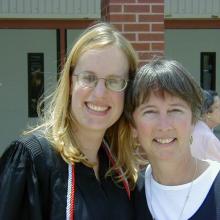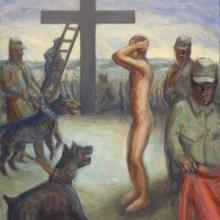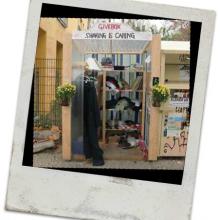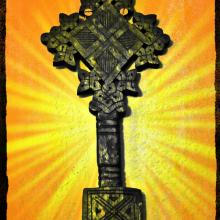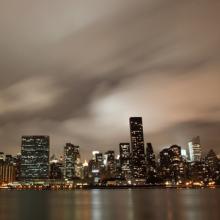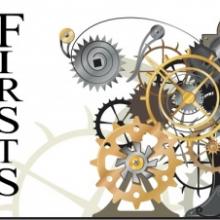Poetry
Yesterday Kay Stewart shared this at the cemetery as we laid to rest the ashes of her first-born daughter Katherine (“Katie”).
For Christ to have gone before us,
To have kept us from ultimate sadness,
To be our brother, our advocate,
The One who ushers in the Kingdom,
Here
And the One to come,
Does not keep us from our digging today.
We still gather here and throw the dirt on our sacred dust,
We take the shovel like all those gone before us
And surrender to the Unknowable—
The place where
Love and Beauty and Kindness grow wild.
Where sorrow has no needs,
Where there is all beginning and
Nothing ends.
...
I
The crumpled woman pushes through the door
and sees your plump limp limbs
held tight in my buckled arms.
She remembers holding
such sweet eternity.
Blindfolded and gagged, tossed in the back
of a car—it's how they gather up young men
and after tire irons and chains, leave some
lying in the road like dirt, rained on all night.
Some are bundled-up, tossed off a bridge
into the river whose muddy swirls warn:
kick, fight, breathe, twist your arms free.
Some do. They rise, spit out the rags
stuffed in their mouths, limp back to town,
and one begins to sing—slow at first— Lord,
I want to be in that number ... Another moans
a low muted tone where words won't go.
Hemorrhaging from the concertina
crown, brass knuckles, scourging, cigarette burns,
lurching the last meter of Golgotha
where He must dangle three hours in urns
of japing ether, He drops His bloody tree.
Executioners rip His clothes away,
cut cards for His keepsake convict jersey.
Deep with one savior’s death, how many more?
In observance of which, the Dresden burghers
as usual held Shrove Tuesday circuses
around Our Lady’s Church, the Frauenkirche,
eating pancakes before their fast for Easter.
Something called a GiveBox appeared
this fall on Falckensteinstrasse, and my first gift
was a memory: Dorothy Day, decades ago,
gently quoting St. Basil to me: If you have two coats,
you've stolen one from the poor.
Like a walk-in cupboard on the sidewalk, brightly
painted, decked out with flowers, this GiveBox
is for the anonymous exchange of gifts.
I cannot
think that you don't
sound
or breathe
weep
or grieve
I will not
think that you don't
want
or ply
the cosmos
with love
or grace
seeking
us
lost again
I can believe
I can lose you
I can thwart you
I can set you up
I can watch you fall
to die
again
you breathe
weep
cry
sing
and I
am here seeking
better signs
You wait a long time for Christmas morning
drifting asleep even as the ebony slate of sky
shatters in clarion silence
Glory, Hallelujah!
and shepherds in the hills cast down their rods
look up at angels and find themselves
no longer huddled in darkness
but lucent between the stars.
What’s the first thing you think of when you think poetry readings by a Poet Laureate and a Pullitzer Prize winner? Well, whatever it is, I’m sure you weren’t thinking dogs.
Nonetheless, pet dogs were brought up more than anything else during poetry readings by Billy Collins and Mary Oliver at the Strathmore in Bethesda, Md. on Sunday. They managed to bring up their dogs in a beautifully poetic way, of course.
But perhaps the most important take away from the evening came from Oliver during a question and answer time after the readings. She said something like this: “Pay attention. Be astonished. And tell about it. We’re soaked in distractions. The world didn’t have to be beautiful. We can and should think about that beauty and be grateful.”
Those are words I have tried to live by for the last year.
Both poets demonstrated that attention in their work — even in poems about dogs.
He uproots teeth primordial in nature and that eat his soul
with appetite the size of mercenary forces plundering a city
whose inhabitants do not fight back because most of them
are women, children, and animals that creep on all fours.
He knows of a city not spared and is without name, unlike Nineveh,
whose repentant king decreed:
Human beings and animals shall be covered with sackcloth,
and they shall cry mightily to God.
About love she was all wrong,
the old capitalist, patron saint
of the self-made rich. How well
she misunderstood the paradox deep
as mothers’ grief: that finding our self
requires losing it, that love and loss
make one truth, not two. Objective
as granite in relationships, her hero
never collapses into cancer with a wife,
never drops into death with a brother.
 I stepped down from the train,
I stepped down from the train,
Saw you there, old man, bent
Next to the Tudor station, smiling
And waving to me over the steering wheel.
Your aged blue eyes
Saw us through the maze of roads
Walled by high corn and close trees, roads
Which branch away from the train
Station to the cottage, to your wife’s eyes
And worn wrinkled skin. Her back bent
Over the low table. You turn the wheel
And press the horn, she’s smiling,
Last Sunday, the Catholic singer/songwriter/poet/theologian Pádraig Ó Tuama (who hails from County Cork, Ireland), took to Revolution NYC's "barstool pulpit," to share stories, poems, and wisdom from the spiritual journey — his, yours, ours.
Listen to Ó Tuama's talk inside the blog ...
On Proverbs 8
My saints won’t be named by a church.
Their sainthood won’t stand as statues. Listen.
Voices
calm as cooking directions
play continually—
If any thing’s resurrectible, it’s memory:
those eyes,
song-haloed, so full of lightness
nothing could stop their flight;
not a Thomas who peers into pupils’ darkness,
not a ravenous soul left grounded.
We are born, yin-yanged, of lightning
with saints and putti the lightest of all.
But love-rumpled faces, quick limbs, and pierced hearts
are unstable, done only in clay.
There is nothing casual
about casualties of war.
It is serious business deciding
which of the wounded
get Medevac’d or left behind
on the battlefield.
It is not the ones
with the most severe of injuries
who are transported
elsewhere for treatment
but the ones with the best
chance of surviving them
that make the trip.
“There’s nothing we can do.”
I was thirteen years old, a freshman in high school. This was my first mission trip – a week of working in an elementary school in the Lower Ninth Ward of New Orleans.
Inner-city urban experience, meet private-school-raised girl.
School grounds within the walls of my church, meet bars and constant police surveillance.
The students we were going to serve looked a lot like me, but I could not feel further from their experience

Outside
By Stacy Barton
I sit in the light of two fluorescent bulbs –
one flickering above the workbench,
the other swinging over the washer and dryer –
and wonder over my nest, soon bare.
Here in the garage,
with only the leftover laundry to stir my memory,
I find fewer cues to catapult my heart.
Denial
This has nothing to do with blackness.
This has everything to do with blackness.
Anger
I could break things
but everything is broken.
Bargaining
Maybe I should have left
with the slave catchers.
30 ways to celebrate National Poetry Month, after Easter take a look at some of the sketchiest bunnies, post-apocalyptic artwork, Alec Baldwin interviews Kristen Wiig, Jimmy Fallon revisits his news anchor position, "Walden Pond" to become a digital reality, robots make furniture, and 36 big names in their humble beginnings...
Poetry is language made material.
It presents us with objects and the world, yes, that is part of its materiality, but it also – and perhaps fundamentally – makes our very language into a thing, rather than simply a medium. Like remembering that you exist in time, and becoming aware of your temporality, poetry takes what we are always immersed in and says, Remember; become aware.
Thus it is like all art a meditative practice. You must slow down, quiet yourself, and actively receive – a strange gesture, perhaps paradoxical, but one that is, if nothing else, prayer. And so for Holy Week, I want to present four (mostly) contemporary poems that can direct meditation without limiting it, that can engage prayer in our physical existence and the existence of the Resurrection as event, that can slow one down, that can build sensual memory of the acts we do and life we live in constant remembrance of it, of Him.
